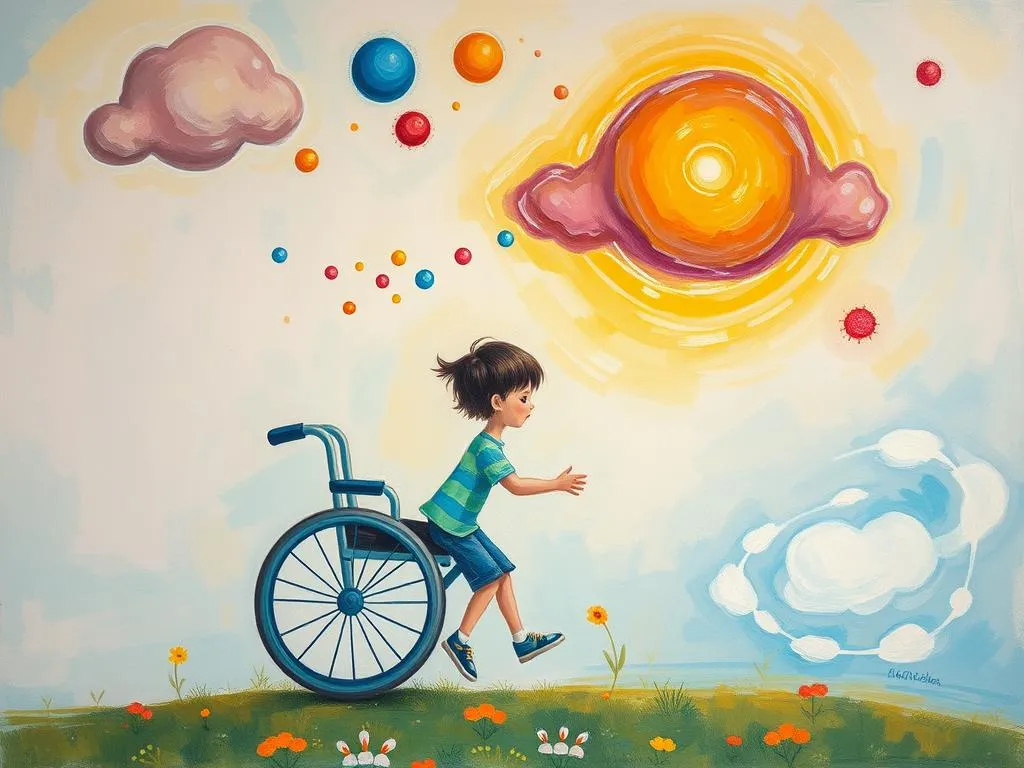
Have you ever woken up from a dream featuring a handicapped child, feeling a mix of curiosity, confusion, and a touch of vulnerability? Such dreams can stir powerful emotions, leaving you pondering their meaning long after you’ve opened your eyes. In a world where dreams often serve as windows into our subconscious, it’s essential to decode these symbols to unveil the messages they carry.
Dreams about handicapped children can evoke feelings of compassion and protection but may also touch on themes of limitation and societal perceptions. This article will explore the significance of these dreams through various lenses, offering insights that can help you navigate your emotional landscape and perhaps find pathways to personal growth.
Fragile Symbols: The Meaning Behind Handicapped Children in Dreams
When we dream of handicapped children, we often encounter a rich tapestry of symbolism. Children, in general, are embodiments of innocence, potential, and the future, while the aspect of handicap introduces layers of complexity regarding limitations, vulnerability, and societal expectations.
-
Compassion and Nurturing: At the heart of these dreams is often a deep-seated desire to care for others. The presence of a handicapped child may symbolize a yearning to nurture or protect something vulnerable—be it a relationship, an idea, or even a part of yourself that feels inadequate or overlooked.
-
Reflection of Self: These dreams may serve as a mirror reflecting your own insecurities or feelings of inadequacy. Just as a handicapped child might face societal barriers, you might feel restricted in your life by circumstances beyond your control. This dream prompts you to confront these feelings and consider what is holding you back.
-
Societal Perspectives: In many cultures, handicapped children are often viewed through a lens of pity or concern. Dreaming about them may urge you to reflect on how you perceive vulnerability in others and in yourself. It asks you to challenge societal norms that dictate how we view those who are different, encouraging a more compassionate mindset.
-
Change and Adaptation: The imagery of handicapped children can also highlight the need for adaptability in your life. Just as a child learns to navigate their world with limitations, you may be called to embrace your own challenges and find new ways to thrive despite them.
By unpacking these symbols, you can begin to understand the underlying messages in your dreams, which may inspire you to seek compassion, challenge your perceptions, and adapt to life’s challenges.
Tales of Innocence: Scenarios from the Dream World
Now that we’ve explored the symbolic meanings behind dreams of handicapped children, let’s dive into a few scenarios to illustrate how these dreams might manifest in your life. Each scenario offers a glimpse into the emotional narratives that may accompany your dreams.
-
The Lost Child: You dream of a lost handicapped child, wandering aimlessly in a crowded market. The child seems confused and scared, and you feel a rush of urgency to find them and bring them back to safety. This dream may symbolize a fear of losing touch with your own innocence or vulnerability. It could reflect a part of yourself that feels isolated or misunderstood in a chaotic world.
-
The Caring Guardian: In another dream, you find yourself as a caregiver for a handicapped child, nurturing them and providing comfort. You feel a profound connection and a sense of purpose. This scenario may indicate a desire to nurture an aspect of your life—be it a project, a relationship, or even your own emotional wellbeing. It highlights your capacity for empathy and the strength that comes from caring for others.
-
The Schoolyard Encounter: You dream of being at a playground where children are playing, but one child sits alone in a wheelchair, watching everyone else. You feel compelled to approach them. This dream may reflect your own feelings of exclusion or the need to reach out to someone who feels marginalized. It encourages you to seek connections with others and to advocate for those who may feel overlooked.
-
The Inspiring Teacher: In a more positive twist, you dream of a handicapped child excelling in a school environment, inspiring others with their determination. You witness their triumphs and feel a sense of pride. This scenario may symbolize hope and resilience, reminding you that limitations can be overcome and that there is beauty in perseverance.
-
The Family Reunion: You dream of a family gathering where a handicapped child is the center of attention, drawing everyone together with their joy and laughter. The atmosphere is filled with love and acceptance. This dream may represent the importance of family bonds and the acceptance of each other’s differences. It highlights the idea that love transcends limitations and that connection is vital for emotional healing.
These scenarios illuminate the diverse emotional landscapes that accompany dreams of handicapped children. Each dream serves as a reminder of our shared humanity, the challenges we face, and the bonds that connect us.
Embracing the Journey: Personal Growth Through Dreams
As we navigate the complexities of dreams about handicapped children, it becomes clear that these dreams can serve as powerful catalysts for personal growth. They prompt us to confront our own vulnerabilities, challenge societal norms, and foster compassion. Here are some practical insights to guide you on your journey of self-discovery:
-
Reflect on Your Feelings: After experiencing a dream about a handicapped child, take time to journal about your emotions and thoughts. What feelings arose during the dream? How do they relate to your waking life? This reflection can offer valuable insights into your subconscious and help you understand the underlying messages.
-
Challenge Societal Norms: Use these dreams as an opportunity to examine your perceptions of vulnerability and disability. Consider how societal attitudes influence your feelings toward others and yourself. Engaging in conversations about inclusivity and empathy can broaden your perspective and foster a more compassionate mindset.
-
Explore Your Limitations: If you feel restricted in your waking life, use these dreams as a prompt to explore your limitations. What obstacles are you facing, and how can you adapt? Embracing change and seeking new solutions can lead to growth and empowerment.
-
Cultivate Empathy: Make a conscious effort to connect with those who may feel marginalized or vulnerable. Volunteering or supporting organizations that advocate for individuals with disabilities can deepen your understanding and compassion. By engaging with others, you’ll gain a more nuanced perspective on the challenges they face.
-
Nurture Your Inner Child: Remember that the handicapped child in your dreams symbolizes not just vulnerability but also the potential for growth and resilience. Take time to nurture your own inner child by engaging in activities that bring you joy and creativity. This can help you reconnect with your sense of wonder and resilience.
Dreams about handicapped children urge us to embrace our vulnerabilities, challenge societal perceptions, and cultivate empathy. They remind us that we can grow from our experiences, transforming limitations into opportunities for connection and understanding.
In closing, consider this powerful reflection: Dreams are not mere reflections of our fears or desires; they are invitations to explore the depths of our humanity. Embrace the lessons they offer and allow them to guide you on a journey of self-discovery, compassion, and growth. Your dreams may just hold the key to unlocking a more profound understanding of yourself and the world around you.







